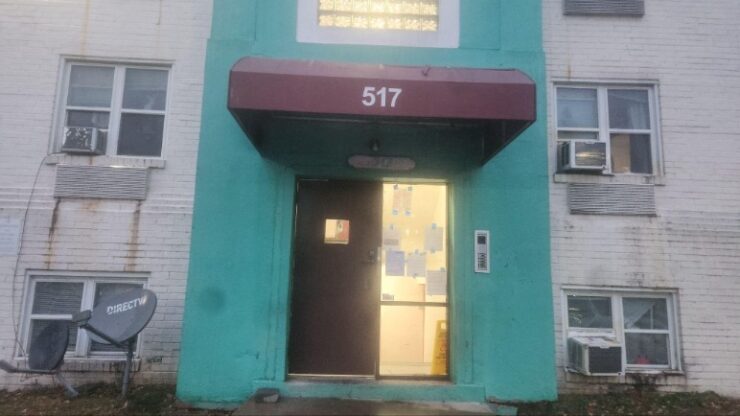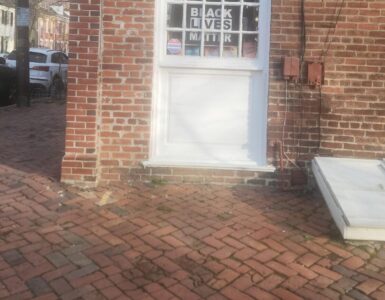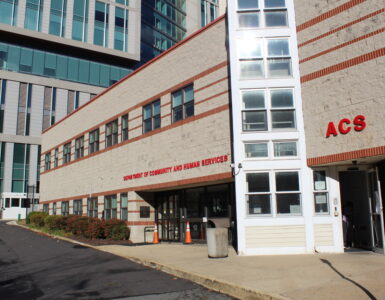Alya Gaskins will make history when she’s sworn in Jan. 2 as Alexandria’s new mayor, becoming the first Black woman to hold the position. But this new leader will face an old problem that has afflicted the city for years: a crisis in housing affordability.
“When I think about the future, our city is now home to hundreds of different ethnic nationalities, cultures and backgrounds, and so the work ahead for us is really figuring out how we integrate new communities into our city and make sure their perspectives, are a part of shaping our future moving forward,” Gaskins told The Wash.
The housing crisis has become an inescapable reality for many who are struggling for a place to call home. Once a haven for people seeking proximity to Washington, D.C., Alexandria is now struggling with skyrocketing rents, insufficient affordable housing, and the displacement of middle- and low-income residents.
“We have not been keeping up with our housing goals, especially when it’s regarding building housing for people with incomes that are below the low to moderate income families,” said Jill Norcross, executive director of the Northern Virginia Affordable Housing Alliance.

Many are hopeful yet wary that Gaskins, backed by a diverse city council, will be able to navigate a future where equitable solutions are urgently needed.
“I think it’s fantastic! As a council member, Mayor Gaskins demonstrated strong support for equity issues, including housing,” said Norcross.
However, Norcross said that having a new person in leadership doesn’t automatically resolve long standing challenges.
“Mayor Gaskins will face similar hurdles to previous mayors and council members, particularly in balancing budgets and managing limited resources,” she said.
Alexandria is committed to the Regional Fair Housing Plan set by the Metropolitan Washington Council of Governments (MWCOG). , The plan focuses on addressing the housing crisis on a regional level. Alexandria has set ambitious goals in line with this plan, aiming to expand housing production while taking into consideration equity and inclusion.
Despite these commitments, the city has struggled to meet production targets. Key obstacles include exclusionary zoning, limited land availability, high development costs, and challenges in securing funding.
“I think it’s, primarily, always has been, it might always be like a resource issue, right? There’s not enough dollars to meet the needs, the housing needs for all,” said Norcross.
The Alexandria City Council has recently adopted the Alex West plan to address housing issues, particularly tenant displacement. The plan includes provisions for relocation support.
Focusing on the west side of Alexandria, particularly west of I-395, Gaskins said she advocated for the Alex West plan to include tenant relocation support, in addition to pushing for more resources toward preserving existing affordable housing to maintain stability for current residents.
“I think, for me, when I think about where I really want to focus, there’s always three legs to the stool. The first leg is the units we produce and trying to produce new units at deeper affordability levels. The second is preservation. And then the third part is really tenant protections,” said Gaskins
The Housing Master Plan is another multi-year initiative that aims to address the city’s housing challenges. The plan outlines strategies to increase housing affordability including inclusionary zoning policies and accessory dwelling units in addition to educating the community about the role of affordable housing in supporting Alexandria’s social and economic life.
Although these plans are in place, residents in Alexandria’s vulnerable neighborhoods feel underserved when it comes to affordable housing, particularly in terms of adequate space and hygiene standards.
For Monci Herrera, who lives in a one-bedroom apartment in the Arlandria neighborhood with her single mother and two siblings, this reality hits home. Despite her mother working as a caregiver and managing to pay $1,500 a month, the challenges of limited space and basic living conditions remain a daily struggle.
“Rent is going high everywhere, so I think we’re good how we are now, but we had to do some renovation out of pocket,” said Herrera.
She said she even keeps cats to fend off persistent rats, a common issue plaguing many residents, including her neighbor, Michelle Coberro

“I think nobody deserves to live in housing. Just for housing sake. We want housing that is high quality, that promotes people’s health and well-being, and so making sure we’re putting in resources to help keep up these properties,” said Gaskins
For Coberro’s family, the situation is even more challenging. With five family members, they had to rent two apartments, breaking through a wall to create a livable space. The combined rent of nearly $2,000 is split between her single mother and uncle.
“We paid for the renovation, and we now pay extra in rent. But we did what we had to do to have enough room for everyone,” said Coberro.
Arlandria neighborhood is included in the city’s redevelopment plans focused on the west side of I-395. The neighborhood, which has a large Spanish-speaking population, has been in the spotlight due to the pressing need for not only affordable but also quality living housing.
“We’ve had plans on moving out, but in the meantime my mom is a single mom, and she can’t do everything on her own,” said Harrera. “So far for now, this is all we could probably afford.”
Gaskins reflected on her personal experiences growing up with a single mother who faced financial hardships.
“There were many times where we just struggled to make ends meet, and that looked like nights when there was no food in the fridge, that looked like the eviction notice on the door when coming home from school when the lights being shut off,” she said
Gaskins said her upbringing shaped her commitment to addressing inequality and improving support for vulnerable families.
“All of my leadership is really a reflection of trying to make sure that no other child or no other family has to deal with those challenges,” she said.















Add comment